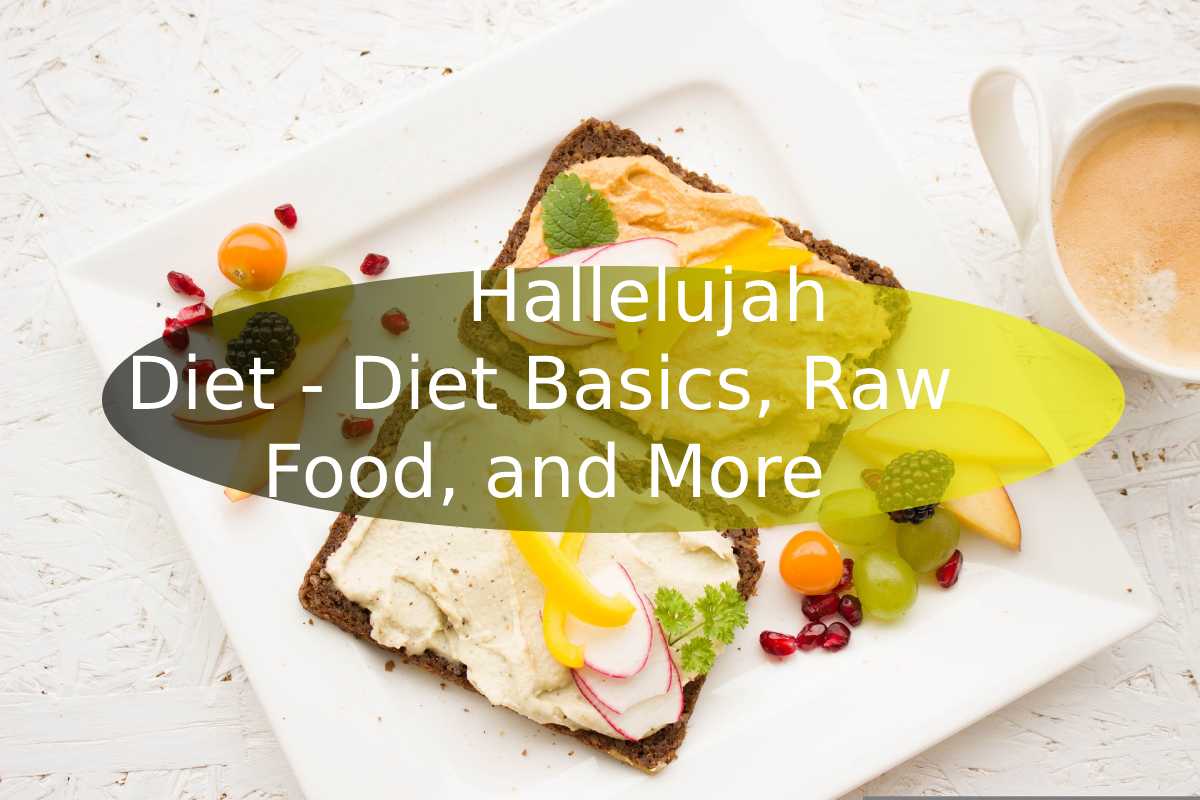Table of Contents
Hallelujah Diet
The Hallelujah diet is a plant-based on a diet that focuses primarily on raw fruits and vegetables and is based on a passage from the Bible.
However, it encourages the intake of whole foods and proprietary supplements to restore the body’s self-healing mechanisms and claims to reverse more than 170 diseases.
Although the diet is very restrictive and requires significant lifestyle changes, the program provides educational tools and resources designed to help you start and maintain the diet long-term.
How does it work?
- The Hallelujah diet contains consuming 85% raw plant-based foods and 15% cooked plant-based foods.
- Moreover, the program’s supplement kits help fill nutritional gaps and improve your health.
The diet is alienated into a four-step plan:
- The first step consists of consuming raw vegetables, fruits, nuts, and seeds.
- This step replaces meat, dairy, refined carbohydrates, sugar, and salt products, known to be toxic foods, with healthier plant-based alternatives.
- This third phase involves juicing and consuming the program’s BarleyMax supplement, an unheated organic juice powder, to enhance nutrient absorption.
- The last step is supplementation, which aims to provide vitamin B12, D3, iodine, selenium, and docosahexaenoic acid (DHA) to prevent deficiencies.
- However, the diet offers multiple supplement kits that vary based on your health status. You can choose to start with the starter kit, which includes BarleyMax and Fiber Cleanse.
- Alternatively, you can opt for the Immune Booster or Detox kits or purchase supplements individually, including probiotics, vitamins and minerals, superfoods, protein powders, and menopause-focused options.
Hallelujah Diet Basics
- However, the Hallelujah diet was developed by Pastor George M. Malkmus after he received a cancer diagnosis, which led him to search for a biblical and natural way to let his body heal itself.
- The passage implies a focus on plant-based foods rather than animal-based foods.
- Therefore, the Hallelujah diet replaces processed, refined, and animal-based foods with organic, clean, raw plant-based foods, primarily fruits and vegetables.
- It comprises a four-step plant-based diet and supplement kits aimed at cleansing your body of the toxins that make you sick.
- In calculating the program’s supplements, the diet provides natural juices, organic protein bars, exercise programs, webinars, and recipes as part of its educational resources.
- In addition, the diet offers the Hallelujah Recovery Diet and Rescue Plans for people with cancer, arthritis, diabetes, irritable bowel syndrome (IBS), Alzheimer’s, and heart and autoimmune diseases.
- Release plans are intended to help your immune system reach maximum healing power.
- In addition, there is the Perfect Cleanse plan, a fasting program that consists of a 5-day cleanse, in which you only consume 6 of their supplements, which is carried out monthly for 3 months.
- The Hallelujah diet promises to recharge your immune system to enable disease reversal.
Foods to eat and avoid
The Hallelujah diet eliminates all processed and animal foods. Because the diet encourages a greater intake of raw foods, it divides foods into three categories: natural foods, cooked foods, and foods to avoid.
Raw food
These foods should make up 85% of your daily intake:
Vegetables: all raw vegetables
Fruit: fresh, sulfur-free organic dried fruit; fruits are limited to no more than 15% of your daily food intake
Grains: Raw Muesli, Soaked Oats, Dehydrated Crackers, and Dehydrated Granola
Beans: peas, sprouted lentils, green beans, sprouted chickpeas, and sprouted mung beans
High-protein meat alternatives: Chia seeds, hemp seeds, and sprouted beans are listed as high-protein plant foods
Nuts and seeds: walnuts, sunflower seeds, macadamia nuts, raw almonds, raw almond butter, walnuts, pumpkin seeds, and tahini (in moderation)
Oils and fats: virgin coconut oil, extra virgin olive oil, Udo oil (a vegetarian omega-3 oil blend), flaxseed oil, and avocado
Dairy: Dairy alternatives only, including fresh almond milk, creamy banana milk, frozen bananas, strawberries, or blueberries as “fruit spreads.”
Beverages: distilled water, powdered diet juices, and freshly extracted vegetable juices; Fruit juices high in natural sugars should be minimized.
Seasonings: fresh or dried herbs, garlic, sweet onion, parsley, and salt-free seasonings
Soups: raw and cold soups made by mixing vegetables and fruits.
Sweets: fruit smoothies, raw fruit tarts with walnut shells or dates, diced dates, walnuts, etc.
Foods to Avoid
These foods obligation be eliminated from your diet:
Vegetables: all canned vegetables with added salt or preservatives and vegetables fried in oil
Fruits: canned and sweetened, non-organic fruits, and dried fruits with sulfur
Grains: refined and bleached flour products, most cold breakfast cereals, and white rice
Beans: genetically modified soybeans
Meats: beef, fish, pork, turkey, chicken, eggs, hamburgers, bacon, hot dogs, sausage, bologna, etc.
Nuts and seeds: all seeds and nuts roasted or salted
Oils and fats: all shortenings, margarine, shortenings, and everything that contains hydrogenated oils or trans fats
Dairy: all milk, cheese, ice cream, whipped toppings, and non-dairy creamers
Beverages: alcohol, caffeinated teas, coffee, isotonic drinks, soft drinks, etc., with preservatives, refined salt, sugar, and artificial sweeteners.
Seasonings: refined table salt and any herb that contains it.
Soups: all canned, packaged, or creamy soups that contain salt, meat, or dairy products
Sweets: altogether refined white or brown sugar, artificial sweeteners, sugar syrups, chocolate, candies, gum, cookies, doughnuts, cakes, pies, etc.
Also Read: How much Caffeine in the Diet Dr Pepper? – Good, Bad, and More

